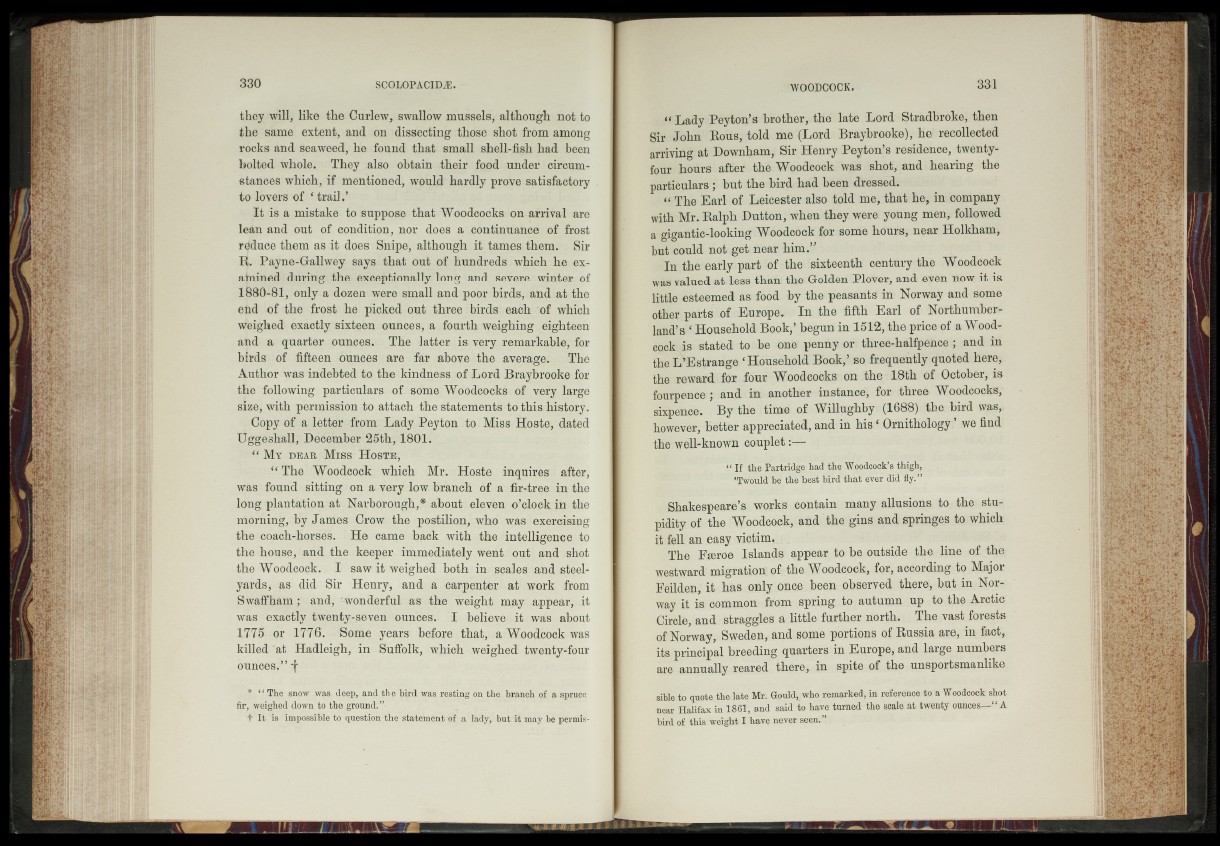
they will, like the Curlew, swallow mussels, although not to
the same extent, and on dissecting those shot from among
rocks and seaweed, he found that small shell-fish had been
bolted whole. They also obtain their food under circumstances
which, if mentioned, would hardly prove satisfactory
to lovers of * trail.’
It is a mistake to suppose that Woodcocks on arrival are
lean and out of condition, nor does a continuance of frost
reduce them as it does Snipe, although it tames them., Sir
hL Payne-Gallwey says that out of hundreds which he ex-
ahiined during the exceptionally long and severe winter of
1880-81, only a dozen were small and poor birds, and at the
ehd of the frost he picked out three birds each of which
Weighed exactly sixteen ounces, a . fourth weighing . eighteen
and a quarter ounces. The latter. 1 is, very remarkable, for
birds of fifteen ounces are far above. the Average. iThe
Author was indebted to the kindness of Lord Braybrooke for
the following particulars of some Woodcocks of very large
size, with permission to attach the statements to this history.
Copy of a letter from Lady Peyton to Miss Hoste, dated
Uggeshall, December 25th, 1801.
“ My dear Miss H oste,
“ The Woodcock which Mr. Hoste: inquires • after,
was found sitting on a very low branch of a fir-tree in'the
lqng plantation at Narborough,* about eleven o’clock in the
morning, by James Crow the postilion, who was exercising
the coach-horse’s. He came back with the intelligence to
the 'house, and the keeper immediately went out and .shot
tho Woodcock. I saw it-weighed both in scales and steelyards,
as did Sir Henry, and a carpenter’ at work from
Swaffham; and, ^-wonderfüL >as the weight may appear, lit
was exactly twenty-seven ounces.i I believe j it was about
1775 or 1776. Some years before that, a Woodcoek was
killed *at Hadleigh, in-'Suffolk, which weighed: twenty-four
ounces.” f
Jt* ‘ ‘ The snow was deep, ^ d j f t e bird was resting prr the, tfr^nch ef a spruce
fir, weighed down.to the ground’.’’-
t I t Is . impossible to question‘the statement bf- a lady, «■ but iSirnTy be pdrniis-
« Lady Peyton’s brother, the late Lord Stradbroke, then
Sir John Rous, »told me (Lord Braybrooke), he recollected
arriving at Downham, Sir Henry Peyton’s residence, twenty-
four hours after the-Woodcock was shot, and hearing the
particulars; but the bird had been dressed.
‘ ‘‘ The Earl of Leicester also told me, that he, in company
with Mr. Ralph Dutton, when they were young men,, followed
a gigantic-looking Woodcock for some hours, near Holkham,
bist.ecmH ^jgeffe.near him.v *’» i
In the early part ;©fr the -sixteenth century the Woodcock
was valued at less than the Golden Plover* and even now it is
little esteemed as; fbbd fey the peasants in Norway and; some
other parts of Europe. In ...the fifth Earl of Northumberland’s
I Household Book,’ begun in 15.12, the price of .a Wood-
eockvis stated to be one penny ars three-halfpence; and in
the LKEstrango ‘Household Book,’ so frequently quoted here,
the reward for four Woodcocks on the 18th ©f October j is
fourpence; and in another instance* for three. Wo&Moe^
sixpence’. By the itime of Willughby (1688)i'the bird was*,
hewever, better appreciated, and in his ‘ Ornithology.’ me find
the well-known c o u p l e t / j
‘ ‘ If “tbe Partridge had /he. Woodcock’s thigbj. -
rTf «CwbubfM tliemSfc bird'thWeVer dSTBjp®
Shakespeare’s works contain many allusipns to the- stupidity
of the Woodcock, and the gins and springes tp which;
it fell an easy^ftihidiff
The Faeroe Islands appear to be outside the line of thh
westward migration: ©f-thaWoodcoek, for, according, to Major
Feilden, it has only onpe been-« observed there', but in.Npijd
way it isi common' from spring to autumn up>tp .the Arctic,
Circle, and straggles a little further north.. The vast forests
ofrNorway, Sweden, and some portions of Russia are, in fact,
its principal feeding, quarters in Europe, and large numbers
are annually reared there, in spite of the unsportsmanlike
aibie.fo quote the late Mr. Gpuldj.who remarked, id reference, to ’a Woodcock: shot
near Halifax in'T864, and said to have turned the scale, at twenty ounces—* f A;
. bird o f this weight I have never seen1..’* S -